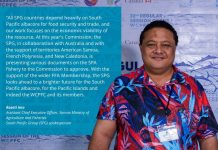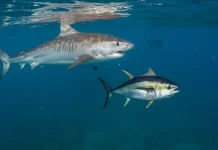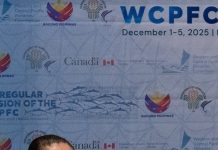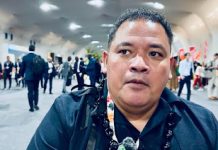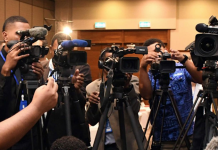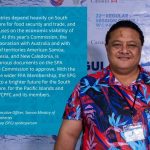Passing the final hurdles
As Bougainville marks two years since its historic independence referendum, Pacific leaders must work together to ensure the process does not falter, Ben Bohane writes.
There were colourful rallies around Bougainville in late 2019 as people prepared to vote in a referendum they had waited decades for. In the carnival atmosphere, people tooted car horns and yelled “Box two, Box two!” referring to the box on the ballot paper to tick for independence.
Many observers expected that a clear majority would vote for independence, but few could predict how resounding the result would be. Of 206,000 registered voters, nearly 98 percent voted for independence, sending a clear signal that Bougainville was united in its push for nationhood.
The 2019 referendum was the culmination of a 20-year peace process – under the catchphrase ‘peace by peaceful means’ – following a bloody 10-year war from 1988 to 1998 that claimed as many as 20,000 lives.
While the referendum result might have been resounding, it is not the end of the process. According to the Bougainville Peace Plan, any result must be ratified by the Papua New Guinea (PNG) parliament in order for it to be implemented. There remains some doubt whether this final step will happen, causing unease on all sides and fears that this could turn into a regional crisis again if left unresolved.
Bougainville’s President Ishmael Toroama was elected in 2020 because he was seen as a strong leader committed to independence in the final stretch. His background as a former Bougainville Revolutionary Army (BRA) Commander nicknamed “Rambo” – and his role as manager for a popular local band – added to his popularity.
On the other side, PNG Prime Minister James Marape continues to shepherd the peace and referendum process on behalf of the country in its consultations with Bougainville leaders via the Joint Supervisory Body (JSB). Prime Minister Marape has said Bougainville is the biggest issue facing PNG, while the United Nations continues to play a role in facilitating dialogue and weapons disposal.
However, he is in a difficult position – few national leaders want to go down in history for ceding territory.
In July this year, President Toroama threw down the gauntlet by setting a deadline of 2027 to reach a final settlement. In its long struggle for independence, Bougainville leaders have issued two Universal Declarations of Independence (UDI); the first in 1975 to pre-empt rule from PNG and then again in 1990 in the early years of the war. It should not be discounted that it might do so again in 2027 if PNG’s parliament has not ratified the referendum result.
Yet PNG faces difficulties in passing this final hurdle. Given the electoral churn in PNG, most of the parliamentarians who will vote on ratification may have little first-hand understanding of the crisis 30 years ago. They also must, like the prime minister, juggle a sense of nationalism and reluctance to let Bougainville go with the need for reconciliation and resolution.
In addition to a reluctant PNG polity, the geopolitics around Bougainville independence have further complicated the issue.
Australia and New Zealand have invested heavily in the peace process and wish to be seen as ‘honest brokers’ in any resolution, while it’s widely considered by observers that Indonesia is against Bougainville independence, lest it give legal precedence for their own troubled Papuan provinces to strengthen their push for independence. Indeed, there is a strong argument that PNG needs to focus on the security of its western border, rather than trying to hold on to Bougainville in the east.
China also has an interest, having offered large infrastructure projects in return for access to Bougainville’s rich mineral wealth. This melting pot of contested interests is why a delay in ratification by PNG’s parliament and potential UDI by a frustrated Bougainville could quickly escalate to a regional crisis.
The PNG Defence Force (PNGDF) has reconciled with the BRA and has no appetite to go back and fight to keep Bougainville part of PNG. The ‘domino theory’, which assumes that Bougainville’s independence will trigger a wave of similar moves by other restless provinces in PNG, is often cited but perhaps overrated. No other province in PNG has the long history and dedication to independence that Bougainville has.
Uniquely, Bougainville has large fishing grounds and mineral resources – Bloomberg estimates more than US$58 billion in copper and gold reserves remain at the Panguna mine alone – to develop a self-sustaining economy in time.
Although blessed with resources, any mining-based economy is fraught with dangers – as Bougainville’s own recent history has shown. However, while the economic challenges that Bougainville must face are considerable, they are not insurmountable.
Importantly, Bougainville is currently developing its agricultural resources, particularly cocoa, while trying to manage its pandemic response and border issues with Solomon Islands.
It is vital that Australia – who spends roughly $60 million per year in development assistance to Bougainville via PNG – continue assisting with pandemic relief, infrastructure funding, and support for the peace process. Whilst unlikely to be seen as neutral given its interests in the region, Canberra must be careful to be seen by both PNG and Bougainville as an honest broker that will not interfere in the peace and ratification process for its own ends.
Many, including some politicians in PNG, hope PNG will ratify the vote to bring a lasting peace and political settlement to both territories. But in the event this falters, Australia and New Zealand may need to demonstrate strong leadership together with regional groups like the Pacific Island Forum and Melanesian Spearhead Group if they wish to see the Bougainville issue solved within the Pacific family.
SOURCE: POLICY FORUM/PACNEWS



